反服貿 群眾佔議場 創歷史 反包圍 弱勢警力難清場 僵持中
反服貿 群眾佔議場 創歷史
反包圍 弱勢警力難清場 僵持中
責任主編:王顥中
反服貿協議創下首次立法院議場遭到群眾攻陷佔領的事件!3月18號晚間,群眾由立法院三個門口同步發
Thursday, March 20, 2014
動推擠攻勢,500群眾衝破警方封鎖,進入立法院內,接著群眾再突破議場,進行佔領,各地陸續趕到的民眾也開始在立法院外聚集,人數已經達到2千人。凌晨警方經過三波攻堅無法突破後,遭到越聚越多的立法院外群眾反包圍,由於群眾要求警方,只要不對議場內進行清場,群眾也不進行攻擊,在警力相對弱勢的情形下,目前對議場進行清場的動作也暫停,雙方陷入僵持。
18號晚間,就在立法院濟南路側,「守護台灣民主晚會」進行之際,9點10分,一聲令下,群眾由中山南路大門、青島東路側門,以及濟南路側側門,三邊同步開始攻堅,其中群眾力量最強、警力相對最薄弱的濟南路側首先被突破,群眾進入立法院後,以油壓剪破壞議場的玻璃窗,現場由立法院駐衛警組成的警力無力阻擋,群眾陸續進入議場,並且將議場的各門以桌椅封住,警方被迫只能把守立法院圍牆及議場外圍,准出不准進。
群眾攻佔議場的消息傳出之後,由各地趕到的聲援群眾越聚越多,不過,19號凌晨傳出行政院長江宜樺致電立法院長王金平,表示將調動中正一分局警力,排除群眾的佔領,而王金平已經同意的消息,議場內的氣氛逐漸凝重,現場黑色島國青年成員與現場支援的大學教授等,紛紛上台,提示警方驅離時的注意事項,並強調「非暴力原則」,希望群眾在被警方抬離時不要以肢體或言語反抗,但是要消極地不配合。
凌晨3點,黑島青將群眾聚集到主席台前,要大家坐下手勾起手備戰,凌晨3點40分,警方展開第一次攻堅,企圖突破兩側及主席台後的門,但是在群眾奮力防守下,攻堅失敗,此時也傳來各地聲援群眾已經將警方「反包圍」,雖然議場已從內部封鎖無法進入,但群眾還是架設鐵梯、翻牆、爬窗等方式持續湧入議場大樓的二三樓,而立法院正門的「立法院」匾額也遭到拆下的消息,議場內的群眾在興奮之餘,紛紛就地休息,積蓄經歷準備再戰。
不過片刻的寧靜並沒有持續多久,5點多,天色微亮之際,警方再度攻堅,這一次採取的方法,是把議場的門框拆下,把群眾佈置的部份阻礙物拖出,失去桌椅的防護之後,群眾直接面對警方,但是新的變數是立法院外,已經對警方形成反包圍形勢的群眾,警方向議場攻堅,群眾也從外面突破警方的封鎖線,甚至直接把警察拖出來,在這種內外夾擊的形勢下,警察從議場裡拖一兩個人出來,反而有五六個警察被外圍的群眾拖出去,而被帶出議場的群眾又隨即加入外面的群眾。
此時的形勢是,議場內是群眾被警方包圍,但是警方又被立法院外的群眾包圍,在群眾力量壓過警方之時,場外宣佈,只要警方不持續對議場內進行清場,場外的學生也不會向立法院進行攻堅,早上6點30分,警方將議場的門再度關上,清場的動作也暫緩下來。此時的情勢是,雖然天亮後才來到現場的群眾無法進入議場,但是以攻為守,反包圍警方的力量越強,議場的防守就會更穩固。
在17號國民黨立委張慶忠主導下,強行將《服貿協議》送院會,原本今天(3/19),在內政委員會要進行確認議程的動作,目前已經確定不會進行,同時,週五的院會也已經確定並沒有將《服貿協議》排入議程,也就是說,服貿戰線還將要延長到下個禮拜,目前僵持的情勢,也有可能發展成為一場持久的耐力戰。對於服貿審議,黑島青提出「立即退回」、「王金平不得動用警察權」以及「通過任何兩岸協議前,先通過《兩岸相關協定簽訂及監督條例》」三項訴求。
LEGISLATIVE SIEGE: Business, industry groups press for passage of pact
LEGISLATIVE SIEGE: Business, industry groups press for passage of pact
AGE CONCERNS:Some business leaders said that they fear the student protesters are too young to be able to understand the economic need for the pact
Staff writer, with CNA
Commerce and industry groups yesterday called for quick passage of the cross-strait service trade pact, as protesters continued to occupy the Legislative Yuan’s main chamber in protest against efforts to push the deal through the legislature.
Lai Cheng-yi (賴正鎰), head of the General Chamber of Commerce and chairman of the Shining Construction Group, and Yeh Ming-feng (葉明峰), a consultant with the Chinese National Association of Industry and Commerce, said they respected the concerns expressed by the students protesters and other activists.
However, they said the students may be too young to fully understand the international economic situation or the pact, which was signed in June last year, but must clear the legislature before it can be implemented.
Describing the pact as vital to efforts to boost the nation’s economy, Lai said it should be passed as soon as possible to take advantage of the Chinese market of 1.3 billion people and to make up for opportunities lost since the pact was signed.
Similar views were expressed by Taiwanese game developers, who have recently placed full-page advertisements in major Chinese-language papers in support of the pact, which would expedite China’s processing of locally developed games and thus give them an edge over foreign and counterfeit games.
Meanwhile, some Taiwanese businesspeople in China have criticized the protest, describing it as “violent” and warning that it could undermine Taiwan’s democratic values.
Han Chia-chen (韓家宸), head of a Taiwanese businesspeople’s group in Tianjin, China, questioned whether the protesters truly understood the significance of the pact to Taiwan.
With South Korea signing more free-trade deals, tariffs on 80 percent of its foreign trade will be removed, compared with less than 10 percent of Taiwan’s exports, Han said. The protesters must face the reality of market conditions, he said.
Lin Ching-fa (林清發), head of an association of Taiwanese-funded businesses in Beijing, said the protesters are setting a bad example by seeking to reverse a legislative decision that reflects the majority of public opinion.
Lin said the protest would make more sense if it was being staged by businesses that will be directly affected by the pact.
Machinery and banking groups in Taiwan, as well as 138 businesses that are members of the Association of Taiwan Investment Enterprises on the Mainland, are more representative of the public’s opinion toward the pact. These groups have placed advertisements and statements in the media highlighting the importance of the pact, he said.
This story has been viewed 355 times.
LEGISLATIVE SIEGE: People from near and far give support to protesters
LEGISLATIVE SIEGE: People from near and far give support to protesters
By Peng Hsien-chun and Chiu Yen-ling / Staff reporters
A truck full of drinks yesterday appeared outside the Legislative Yuan where a sit-in by students and other activists protesting against the cross-strait service trade pact was being held.
“You have had a long day,” the truck driver from New Taipei City, surnamed Shih (施), said to the protesters.
He said he had been “almost driven mad” watching news reports since the demonstration began on Tuesday and was deeply moved by the students’ action. He said he could not do much to help the protest, except offer some drinks for the students.
“The nation’s economy is not doing well and I am worried that young people will not be able to find a job or make money,” Shih said.
“The future of the young is the future of Taiwan, and the government’s messing around should not be tolerated,” he said.
Supplies and moral support appeared yesterday from Chen Jui-chu (陳瑞珠), who had also been motivated by news reports.
The Changhua County resident drove to Taipei yesterday morning with her children and mother-in-law, bringing raincoats as well as instant noodles and other food for the students.
She said she had considered sending the supplies by speed post, but decided to save time be bringing them herself.
Her husband supported her decision, Chen said as she and her children passed the food to students equipped with pushcarts.
Chen had photographs of her children taken on the scene, saying that the pictures would be a souvenir of their witnessing democracy.
Meanwhile, several tents were set up yesterday outside the Legislative Yuan complex for more than 20 families with small children who are taking part in the protests.
The mothers, who had been there for two days, said “it was our duty” to maintain a bright future for their children.
They were busy protesting and attending to their children as the temperature dropped yesterday.
One of the women, Hsu Shu-huei (徐書慧), said she came to voice her concerns because the service trade agreement will have a great impact on Taiwan, but was very few Taiwanese understand it.
“It is a very serious problem,” Hsu said.
Students give Ma, Wang ultimatum
Students give Ma, Wang ultimatum
OR ELSE:The legislature occupiers demanded that the government reject the cross-strait service trade pact and freeze talks with China pending new monitoring laws
By Loa Iok-sin / Staff reporter
Student activists occupying the Legislative Yuan yesterday issued an ultimatum to the government, demanding that President Ma Ying-jeou (馬英九) and Legislative Speaker Wang Jin-pyng (王金平) respond positively to their demands by noon today, or they would take further action.
“We hereby call on Ma and Wang to respond positively and clearly to our demands,” Chen Wei-ting (陳為廷), a National Tsing Hua University graduate student and one of the main leaders of the protest, said at a press conference in the main hall of the legislative building in Taipei. “We would like Wang to tell us how he plans to deal with Chinese Nationalist Party (KMT) Legislator Chang Ching-chung (張慶忠), a
nd we would like the government to reject the service trade pact with China and suspend all cross-strait talks until legislation on the monitoring of cross-strait agreements is drafted and passed.”
“If Ma and Wang fail to respond satisfactorily to our demands, we will take further action, the specifics of which we will announce at that time,” he added.
Chen said that nearly 60 percent of the public supports the protesters’ occupation of the legislative chamber, which “shows that we are not just a few, rather, we stand for the majority of the public and we are occupying a chamber that belongs to the people and is meant to work on behalf of the people, since the people’s representatives are not doing their job.”
According to police estimates, there were several thousand protesters surrounding the Legislative Yuan earlier in the day, but the number passed 10,000 in the evening, after rumors spread that the police may break in to clear the legislative chamber before daybreak today.
At about 2am yesterday, Wuer Kaixi, one of the Chinese student leaders at the 1989 Tiananmen Square Massacre, appeared on the legislative floor to voice his support for the students’ movement.
“This is 100 percent democracy in action and I admire what the Taiwanese students are doing,” he told the occupiers. “President Ma Ying-jeou claims that he was a student activist when he was younger, but what he’s doing now is a far cry from upholding democratic values; he should come here to apologize to you, the students.”
“As for Premier Jiang Yi-huah (江宜樺), I would like to ask him to resign,” Wuer Kaixi added, before singing Goodnight Taiwan and chanting slogans urging the government to reject the trade agreement along with the students, triggering rounds of applause.
Not long after Wuer Kaixi left, another former Tiananmen Square student leader, Wang Dan (王丹), also put in an appearance at the legislature, but declined to speak, saying he was only there to support the demonstrators.
During the day, more than 40 university professors — from National Taiwan University, National Chengchi University, National Taiwan University of Arts, National Tsing Hua University and Fu Jen Catholic University — appeared on a stage outside the Legislative Yuan on Jinan Road to teach “civic lessons” to students.
Many professors, such as Fu Jen associate professor of psychology Ho Tung-hung (河東洪), invited their students to join them for a lesson on the streets outside the Legislative Yuan, or offered them official leave if they wanted to skip the class to join the protest.
In a letter, National Dong Hwa University president Wu Mao-kun (吳茂昆) praised the students’ action.
“I admire you [students] for showing concern about current issues and bravely voicing your views,” the letter read. “I fully respect your decision if you choose to skip class to join the protest.”
Meanwhile, to ensure the health of the protesters and handle any medical emergencies, about 15 physicians, nurses and pharmacists were on standby at the Legislative Yuan.
“There are physicians, pharmacists and nurses here to handle simple medical needs,” physician Lin Hsin-jung (林信榮) said from the legislature. “Most of our medical supplies were donated by the public or lawmakers, and we [the medical professionals] are here voluntarily to show our support.”
The Taipei-based Legal Aid Foundation’s and the Judicial Reform Foundation have also offered their services to the protesters should they be arrested by police, urging the students to call (02) 3393-8666 for information about legal aid.
Within 24 hours of the hotline being set up, more than 100 lawyers had volunteered to help represent the activists in case of arrests, including Wellington Koo (顧立雄), a Democratic Progressive Party hopeful for the Taipei mayoral poll; Liu Chi-wei (劉繼蔚), who represented late army corporal Hung Chung-chiu’s (洪仲丘) family; and Tseng Wei-kai (曾威凱), who has represented Hualon Corp’s (華隆) laid-off workers.
Additional reporting by Ching Jen-hao
Students issue statement
Students issue statement
By Lee I-chia /
The hundreds of students and demonstrators occupying the legislative chamber have issued a statement detailing their stance against the cross-strait service trade pact, stressing a demand for a fair and competitive future for young Taiwanese.
“We do not want to see young people still living on a NT$22,000 salary [a subsidization policy implemented by the government that gives NT$22,000 to university graduates as a starting salary] 10 years from now,” the statement read.
It said Taiwan is a haven for entrepreneurship, where young people can fulfill their dreams by opening coffee shops or personal workshops and become a “boss” by working hard on their own.
An academic assessment on the impact of signing the pact showed that more than 1,000 trades — covering basic necessities like food, clothing, housing, traffic and different stages of life from birth to death — will be affected, although the pact only listed 64 sub-sectors for opening up to Chinese investment, the students’ statement said.
“In the future, Taiwanese small and medium-sized enterprises will face challenges from competition with Chinese-invested companies that have abundant capital and use vertically integrated business models,” it said. “It will also threaten the survival of office workers, farmers, blue-collar workers and businesspeople.”
It said the pact would also impose a threat to the nation’s freedom of speech, by opening up Internet portal sites and Web sites, as well as printing, publishing and distribution channels to Chinese investment.
“Standing against the pact is not an act of ‘always being against anything related to China’ (逢中必反),” it said.
The trade agreement’s greatest problem is that it only benefits the large capitalists, by allowing big corporations to expand without limit across the Strait, while small businesses suffer, it said. “The entrepreneurship haven that we used to be proud of will be gradually taken over by foreign corporations.”
The statement said that the issue is not an argument between unification and independence, or between the pan-blue and the pan-green camps, but one between social classes — a harsh survival problem for young people when facing a few large companies that gobble up small businesses in the agricultural, industrial and commercial sectors.
“We strongly protest against the President Ma Ying-jeou (馬英九) administration — which now has a low approval rating — seizing the legislature to have it approve the service pact in such a violent way and giving away the nation’s future,” the statement said.
It also condemned what the students said was Chinese Nationalist Party (KMT) Legislator Chang Ching-chung’s (張慶忠) sudden call on Monday to end a committee meeting and arbitrarily conclude that the review was finished and approved because of it was taking too long.
It said Chang’s conclusion was a total betrayal of the legislature’s promise to review the agreement item-by-item, which was agreed to in June last year.
“If the KMT can violently approve a pact that has great impact on the public by circumventing the legislature’s supervision and substantial review, other policies that might more greatly affect economic autonomy can also be approved in the same way,” it said. “Taiwan’s future cannot be forfeited like this.”
“We want to master our own future … we want a fair environment that allows young people to develop and compete,” the statement read.
The demonstrators are young people who are willing to take on challenges, but they will not abide unfair conditions that will lead them to being controlled by few ruling officials or large companies, it said.
“Taiwan is where we live and make a living,” the statement said in its last paragraph. “To stop this unfair and unjust service pact, to stop the political party that is trying to restore authoritarianism and is trampling our legal institutions, please stand with us and protect Taiwan together.”
Activists occupy legislative floor
Activists occupy legislative floor
SIEGE:While police officers made repeated efforts to evict the demonstrators, members of the public ordered food supplies for them
By Loa Iok-sin / Staff reporter
Despite attempts by the police to retake the legislative chamber yesterday, hundreds of demonstrators — mainly student activists — continued the occupation they began late on Tuesday night to protest the cross-strait trade pact, while thousands more outside the Legislative Yuan kept the building under siege.
“Reject the service trade pact! Reopen the negotiations! Defend our democracy!” about 2,500 protesters — within and outside the legislative chamber — chanted during the day.
The occupation began about 9pm on Tuesday, when more than 200 protesters at a rally being held outside the legislature against the trade pact suddenly climbed over the fences and entered the legislative complex.
They quickly took over the legislative chamber on the ground floor, as well as the second floor of the building, blocking entrances with piles of chairs in an effort to keep out the police.
Hundreds more people arrived outside the Legislative Yuan from about 3:40am in a show of support for the initial protesters. Chanting slogans, the latecomers pushed down a metal gate to enter the complex, but were stopped by police from going into the legislative chamber.
Some had brought ladders to climb into the building through second-floor windows, while others rallied in the parking lot outside the building.
The police made several attempts to break into the legislative chamber, but in vain, as the protesters inside resisted strongly, while those outside the chamber pulled officers away.
During one of the confrontations, police officer Chung Chen-chiang (鍾振強), who suffers from asthma, fainted and was rushed to National Taiwan University Hospital.
More people joined in support of the protesters yesterday morning, with many traveling from central and southern Taiwan, raising the number of demonstrators to more than 2,000, according to official estimates.
“We estimate that there are more than 2,200 protesters inside and outside of the Legislative Yuan, and we have deployed about 2,000 officers on the scene,” National Police Agency Director-General Wang Cho-chiun (王卓鈞) said as he paid a visit to Chung at the hospital. “So far, 38 officers have been injured and we have arrested four student protesters.”
Lin Fei-fan (林飛帆), a National Taiwan University student and one of the protest leaders, thanked the public for their support.
“Since our plan is to stay here [in the legislative chamber] until Friday, the first thing we did after getting here was to secure a supply channel,” Lin said.
“We are thankful that a lot of supplies — food, water and other necessities — are flowing in non-stop. This shows that the public is upset with the government and that we have the support of the people,” Lin said.
Activists also hung national flags upside down outside the building to express their dissatisfaction with the government’s handling of the trade agreement.
Many people showed their support for the protesters by ordering boxes of snacks online to be delivered to the legislative chamber. One unidentified person ordered NT$10,000 worth of bread to be delivered.
A number of celebrities, including singer-songwriters Chen Ming-chang (陳明章) and Deserts Chang (張懸), actor Huang Ho (黃河) and entertainer Cheng Chia-chen (鄭佳甄) — who is better known by her nickname “Chicken Cutlet Girl” (雞排妹) — showed up during the day to voice their support for the protest.
The crowd was excited and sang along when Chen led them to sing his hit song Wandering to Tamsui (流浪到淡水).
A number of foreign residents also joined in, including Vietnamese immigrant Lu Viet Hung.
“I am here to protest that the government is trying to pass the pact without the consent of the Taiwanese,” Lu said. “I would like to call on everyone to urge more friends to come out, as this may be a crisis for Taiwan’s democracy.”
While the protest remained mostly peaceful, one girl cut her wrist and used her blood to draw a heart on the wall in the legislature.
She did not give her name to reporters or explain what she was trying to say, and was quickly taken away to the health center.
At the beginning of the occupation, the police tried to force the activists out of the legislative chamber by closing the toilets and turning off the air-conditioning system, but the toilets were reopened early in the morning, and the air-conditioning was turned back on shortly after 10am, after protesters outside the chamber threatened to break in if Legislative Yuan officials did not restore the air-conditioning.
The occupation of the legislative chamber and the siege outside were continuing as of press time.
My Opinion: Confused Courage of Taiwan Student Activists
Workplaces with under thirty workers cannot be legally unionized in Taiwan. There is no overtime pay for most workers who are obliged to work overtime, anyway. The year-end bonus is a tool for the boss to control his workers, and workers look forward to getting it in lieu of higher wages. Mom and pop stores and factories use child labor, usually their own children, and relatives who work for peanuts out of guilt. There is hardly any occupational safety. It seems natural to do business like this in Taiwan.
The work conditions have been poor in Taiwan even before the Japanese imperialists took over the island in 1895. They codified the small farm system as colonial slavery letting the wealthy Han bosses be masters of their own coolie workers brought over by the Dutch, Portuguese, and Chinese to pick tea leaves and distill sugar and opium. Nowadays, American business know-how has modernized the wage slavery with Fast Food Nation mentality; mostly part-time jobs without worker benefits. Taiwanese entrepreneurs have taken well this newfangled exploitation. The Japanese can do it, the Americans can do it, the interlopers from China after WW II can do it, the neo-liberal upstart second party DPP can do it, then why can't the neo-communist unifiers from China today muzzle in on the Taiwan territory and take their own piece of the pie from the workers; why not the whole pie?
What the ruling class has in mind is a sappy mix of Japanese, American, and Chinese bosses. The ruling class has no nationality of its own; it has no home. It has no family, friends, or true love when push comes to shove. The ruling class would sell out their own children and parents to keep its own prestige and power. The ruling class wants only to rule, to sit and tell other people to work for them rather than do the work themselves.
There is nothing the ruling class and the working class have in common.
The students and demonstrators have used guerrilla theater to take over the legislature and barricade themselves in to protest the unilateral trade agreement the Chinese-leaning Kuomintang oppressors would make with their Chinese counterparts. They may see the little picture; lost jobs in Taiwan to imported lower-waged Chinese workers and their bosses. They may see the bigger picture of lives without job security and careers because of the Fast Food Nation franchises. But they don't see the biggest picture: wage slavery without union power and protection. You can't miss something you've never had and Taiwan has never had the right to collective bargaining unions for all workers. Never.
Workers must build the new society out of the shell of the old by organizing in a union against the ruling class. The class war is a war to end all wars. Let the headstrong activists throw their shoes at politicians and barricade themselves in government chambers until the S.W.A.T teams remove them. They will get arrested, go on trial, and eventually be released into a Taiwan society no better or worse for their effort and discomfort. They may be black-listed or face expulsion from college.
For workers, no matter what color the ruling class is - red, blue, and green or red, white, and blue - they will still be victims of the ruling class. They will still need to learn that there is power in the hands of working men and women when they stand hand in hand. It is a power that must rule in every land; One Industrial Union grand.
Solidarity Forever,
x 347367
The work conditions have been poor in Taiwan even before the Japanese imperialists took over the island in 1895. They codified the small farm system as colonial slavery letting the wealthy Han bosses be masters of their own coolie workers brought over by the Dutch, Portuguese, and Chinese to pick tea leaves and distill sugar and opium. Nowadays, American business know-how has modernized the wage slavery with Fast Food Nation mentality; mostly part-time jobs without worker benefits. Taiwanese entrepreneurs have taken well this newfangled exploitation. The Japanese can do it, the Americans can do it, the interlopers from China after WW II can do it, the neo-liberal upstart second party DPP can do it, then why can't the neo-communist unifiers from China today muzzle in on the Taiwan territory and take their own piece of the pie from the workers; why not the whole pie?
What the ruling class has in mind is a sappy mix of Japanese, American, and Chinese bosses. The ruling class has no nationality of its own; it has no home. It has no family, friends, or true love when push comes to shove. The ruling class would sell out their own children and parents to keep its own prestige and power. The ruling class wants only to rule, to sit and tell other people to work for them rather than do the work themselves.
There is nothing the ruling class and the working class have in common.
The students and demonstrators have used guerrilla theater to take over the legislature and barricade themselves in to protest the unilateral trade agreement the Chinese-leaning Kuomintang oppressors would make with their Chinese counterparts. They may see the little picture; lost jobs in Taiwan to imported lower-waged Chinese workers and their bosses. They may see the bigger picture of lives without job security and careers because of the Fast Food Nation franchises. But they don't see the biggest picture: wage slavery without union power and protection. You can't miss something you've never had and Taiwan has never had the right to collective bargaining unions for all workers. Never.
Workers must build the new society out of the shell of the old by organizing in a union against the ruling class. The class war is a war to end all wars. Let the headstrong activists throw their shoes at politicians and barricade themselves in government chambers until the S.W.A.T teams remove them. They will get arrested, go on trial, and eventually be released into a Taiwan society no better or worse for their effort and discomfort. They may be black-listed or face expulsion from college.
For workers, no matter what color the ruling class is - red, blue, and green or red, white, and blue - they will still be victims of the ruling class. They will still need to learn that there is power in the hands of working men and women when they stand hand in hand. It is a power that must rule in every land; One Industrial Union grand.
Solidarity Forever,
x 347367
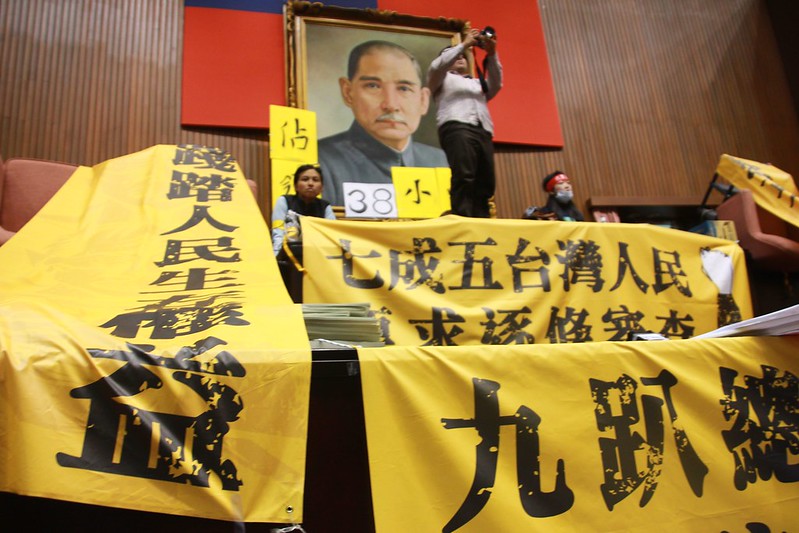 反《服貿協議》寫下群眾佔領立法院議場的歷史。(攝影:孫窮理)
反《服貿協議》寫下群眾佔領立法院議場的歷史。(攝影:孫窮理)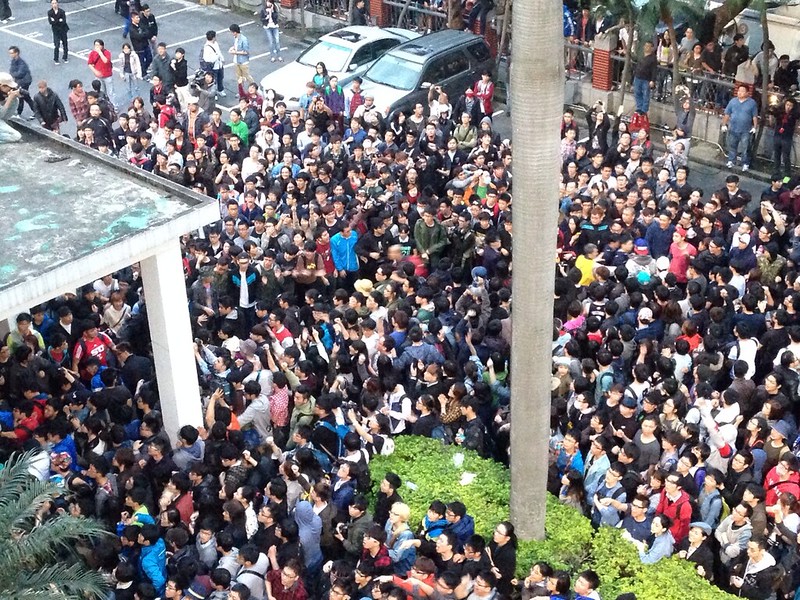 議場外聚集2千群眾,對警方形成反包圍,以攻為守,使得警方無法對議場進行清場。(攝影:王顥中)
議場外聚集2千群眾,對警方形成反包圍,以攻為守,使得警方無法對議場進行清場。(攝影:王顥中)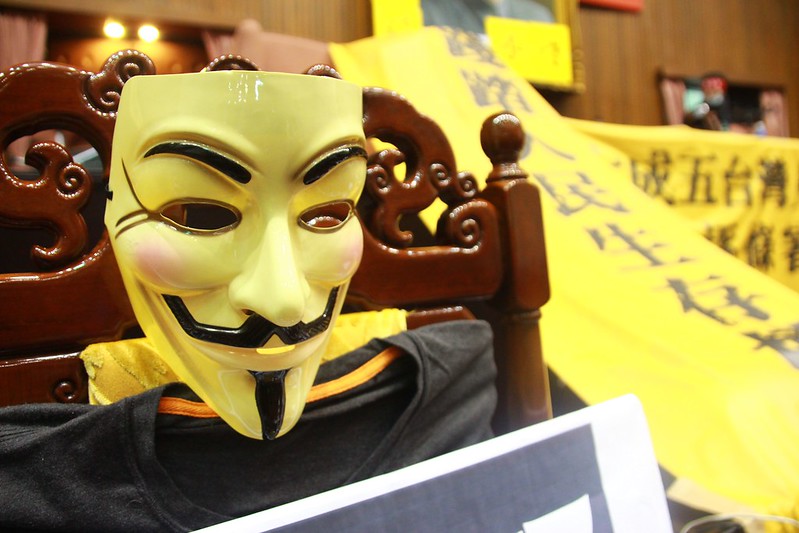 被佔領的立法院議場內。(攝影:孫窮理)
被佔領的立法院議場內。(攝影:孫窮理)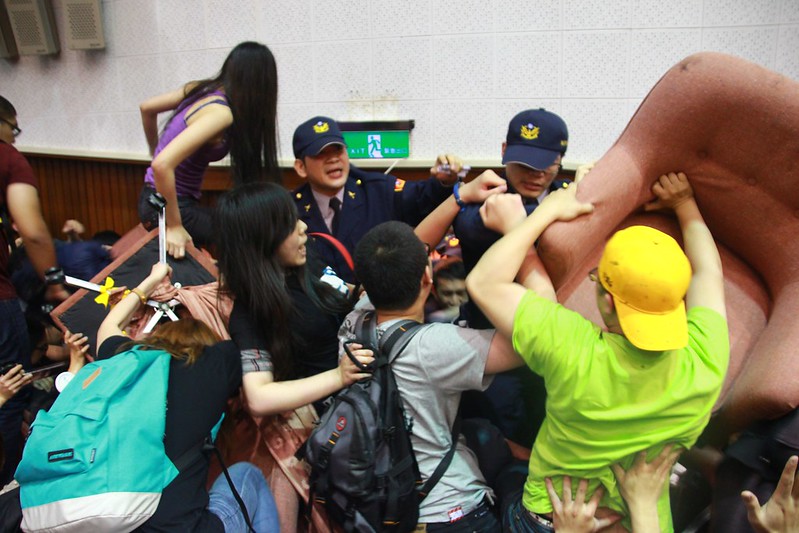 警方的攻堅行動遭到群眾以議場內的桌椅等物阻擋。(攝影:孫窮理)
警方的攻堅行動遭到群眾以議場內的桌椅等物阻擋。(攝影:孫窮理) 議場內,群眾勾起手坐在地上,準備面對警方的抬離。(攝影:孫窮理)
議場內,群眾勾起手坐在地上,準備面對警方的抬離。(攝影:孫窮理)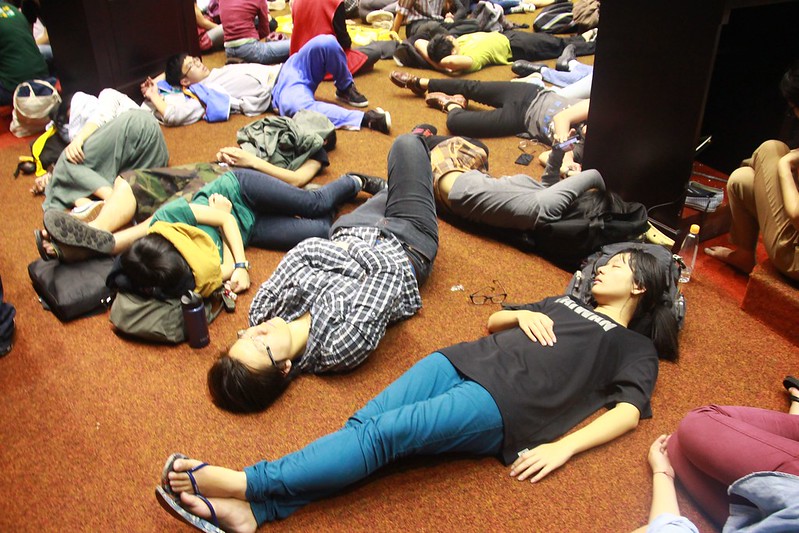 利用平靜的片刻稍事休息。(攝影:孫窮理)
利用平靜的片刻稍事休息。(攝影:孫窮理) 從19日凌晨,立院議場外就聚集了越來越多的群眾,通過架梯、翻牆與爬窗等方式湧入議場大樓。(攝影:王顥中)
從19日凌晨,立院議場外就聚集了越來越多的群眾,通過架梯、翻牆與爬窗等方式湧入議場大樓。(攝影:王顥中)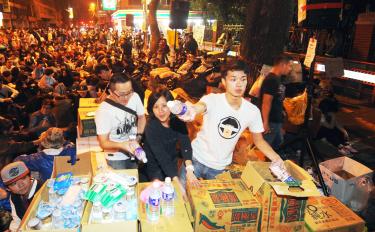
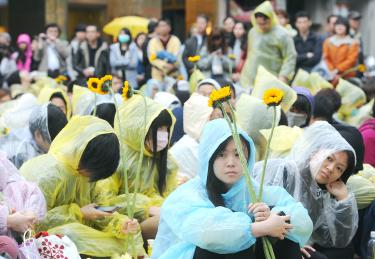
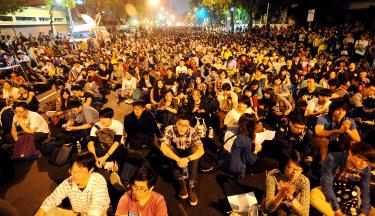
No comments:
Post a Comment